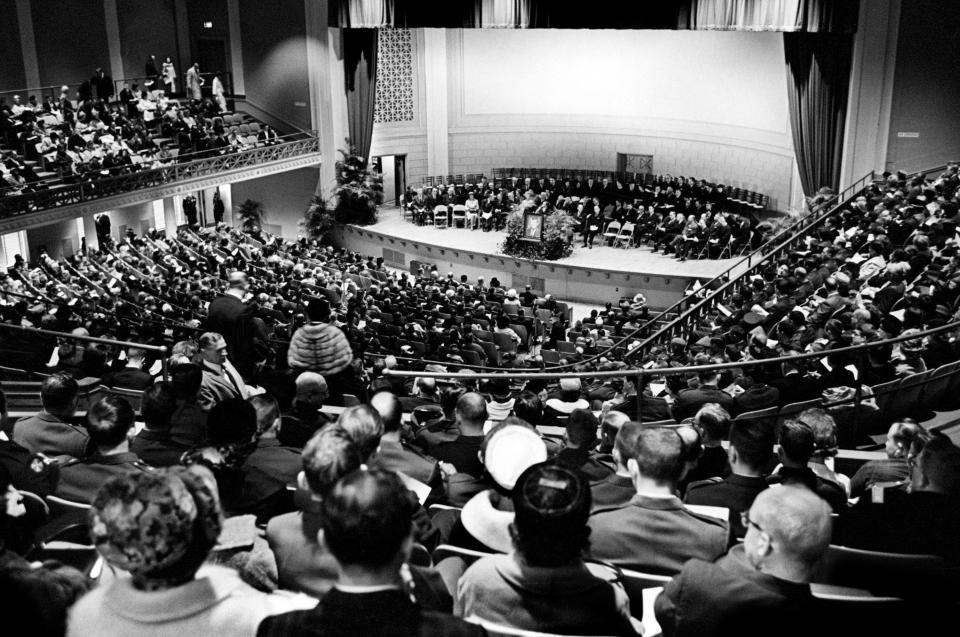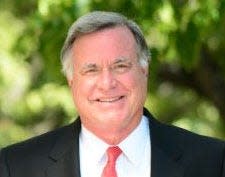Kennedy assassination etched in nation's memory | INSIDE THE STATEHOUSE
- Oops!Something went wrong.Please try again later.
- Oops!Something went wrong.Please try again later.
- Oops!Something went wrong.Please try again later.
The assassination of John F. Kennedy happened 60 years ago this week. It occurred to me that a good many of you may be too young to remember that horribly sad day of Nov. 22, 1963.
Anyone living on that day can tell you exactly where they were when President John F. Kennedy was shot and killed by an assassin in Dallas, Texas. It was a perfect fall day in the Lone Star state.
More: Why negative ads work so well in the political arena | INSIDE THE STATEHOUSE
Lyndon Johnson was vice president and he and Kennedy disliked each other immensely. The Kennedys had put Johnson on the ticket as vice president in 1960 to assure that the Democrats carried Texas in the general election, not because they liked him. It was totally a political marriage. They not only did not like Johnson, they did not trust him.
It was a Friday afternoon. The last high school football games of the year were to be played that night. High school football was big in Alabama. By the way, it was also big in Texas, thus the movie “Friday Night Lights.”

I was in the seventh grade. It was just after lunch. My homeroom teacher at Troy Junior High School was Mrs. Elaine Dodson. All of a sudden, the music teacher for our schools, Jerry Spann, came into our room and announced that the president had been shot. Everyone was traumatized.
The president died about an hour later at a Dallas hospital.
The next three days, all of America watched on television the funeral preparations and the Monday funeral. It was an unbelievably sad event. The scene of the rider-less white horse brought tears to everyone's eyes. If that did not, the scene where little John-John Kennedy, a precious, precocious 2-year-old boy who gave a salute to his father was one of the most heart wrenching, tear-jerking moments I have ever witnessed in my life. It still brings tears to my eyes 60 years later as I write this column.
John-John grew to be a very handsome young man, like his father. He, like his father, died an early untimely death but in in an airplane crash. Even though he did not have political aspirations, I believe that John Kennedy, Jr. would have been president.
I am not a conspiracy theorist, but allow me to illuminate some facts. Johnson was the most ruthless, morally bankrupt, and crudest man to ever sit in the White House. Johnson was the ultimate political animal. He lived by the rule that whatever it took to win and grab control of power is what you did. If you doubt that, read Robert Caro’s books on LBJ, or better yet ask any historian about his years as U.S. Senate majority leader.
In recent years, the Secret Service has released files that reveal the following facts. First, Johnson insisted that Kennedy go to Dallas and campaign. The Secret Service asked Kennedy not to go because the civil rights issue was boiling in Texas. At Johnson’s urging, Kennedy agreed to go.
Second, the Secret Service came to Kennedy and said, “Mr. President, if you go, you cannot use the main artery boulevard in your entourage. We cannot protect you.” Kennedy agreed. When Johnson heard of this, he told Kennedy he had to go down that boulevard because, “It is a Texas tradition,” said Johnson. Kennedy agreed at Johnson’s insistence.
Finally, the Secret Service, in exasperation, told President Kennedy, “Mr. President we asked you not to go to Dallas. We also asked you not to go down that boulevard because we cannot protect you from all the high building windows. To a sharpshooter you will be a sitting duck. If you go to Dallas and go down that thoroughfare, we must insist, you let us put up a protective bubble to protect you.” Kennedy agreed.
Johnson heard of the bubble and insisted to President Kennedy that he could not do that because he would appear distant, detached, aloof and arrogant to Texans. President Kennedy, once again, acquiesced to Johnson’s pleas.
The rest is history.
The horrific, tragic scenes of Jackie Kennedy’s blood stained pink dress, a little 2-year-old boy’s goodbye salute to his father, and the rider-less white horse are indelibly planted in my memory 60 years later. The decade of the 1960s was a very tumultuous and memorable time to come of age in America and Nov. 22, 1963, is etched in a lot of our generation’s minds.

Steve Flowers is Alabama’s leading political columnist. His weekly column appears in over 60 Alabama newspapers. He served 16 years in the state legislature. Steve can be reached at www.steveflowers.us.
This article originally appeared on The Tuscaloosa News: JFK assassination etched in nation's memory | INSIDE THE STATEHOUSE

